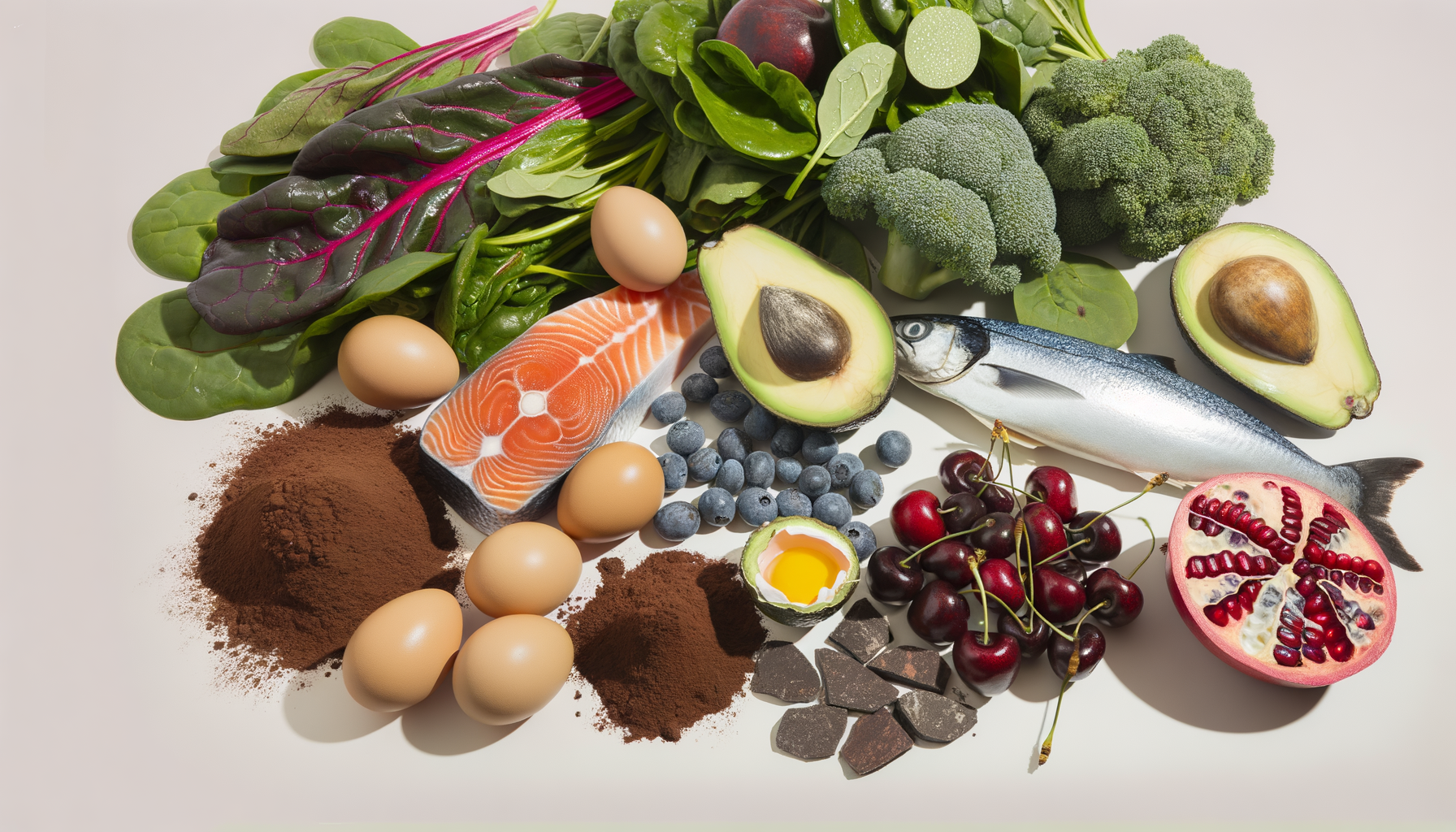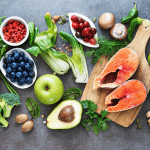Testosterone’s Role in Health
Testosterone is a pivotal hormone in the human body, and not only for men. It is primarily produced in the testicles and plays a crucial role in various bodily functions. Testosterone is responsible for the development of male sexual characteristics, the maintenance of muscle mass and bone density, and the regulation of sex drive and mood. As men age, testosterone levels naturally decline, which can impact these critical health aspects.
Factors Affecting Testosterone Levels
Several factors can influence testosterone levels, including age, medical conditions, certain medications, and lifestyle choices. High body fat levels, specific health conditions, and the use of certain medications can lead to lower testosterone levels. Lifestyle factors such as diet, physical activity, and stress management also play a significant role in maintaining optimal testosterone levels.
The Link Between Diet and Testosterone
Diet is a modifiable factor that can significantly affect testosterone levels. Research suggests that diets high in ultra-processed foods and low in nutrient-dense foods may contribute to lower testosterone levels. Conversely, a diet rich in specific nutrients, including omega-3 fatty acids, vitamin D, magnesium, and zinc, is essential for supporting healthy testosterone production and hormonal balance.
Importance of Nutrient-Dense Foods
Nutrient-dense foods are integral to a diet that supports testosterone production. These foods provide the body with the necessary building blocks to produce hormones effectively. A dietitian would emphasize the importance of incorporating foods high in vitamin D, magnesium, zinc, and healthy fats to help boost testosterone levels. Fatty fish, leafy greens, eggs, and cocoa products are examples of foods that may help increase testosterone to a healthy level when included as part of a balanced diet.
By the way, something for you, a little gift!!!
I am just in the middle of publishing my book. It’s about How women can balance their hormones. One part is about food and diet, of course.
Follow this link and enter your email.
I will send you this part of the book for free once the book is published. It has many concrete, practical tips and recipes and will help you feel better during menopause or times of Big hormonal fluctuations.
Annette, Damiva Lead for Health & Wellness

Nutrients Essential for Testosterone Production
Vitamin D and Hormonal Health
Vitamin D, often referred to as the “sunshine vitamin,” plays a crucial role in hormonal health, including the synthesis of testosterone. Research has shown that men with sufficient levels of vitamin D have significantly higher testosterone than those with a deficiency. This vitamin is essential for male reproductive health and can be obtained through sun exposure, fortified foods, and dietary supplements. Ensuring adequate vitamin D intake is vital for maintaining optimal testosterone levels.
Magnesium’s Role in Testosterone Bioactivity
Magnesium is a mineral that is critical for numerous bodily functions, including the bioactivity of testosterone. It has been found to reduce oxidative stress, which can negatively impact testosterone levels. Studies have demonstrated that men with higher magnesium intake tend to have elevated testosterone levels, suggesting a direct correlation between magnesium consumption and hormonal health. Foods rich in magnesium, such as dark, leafy greens, nuts, and seeds, should be included in a diet aimed at boosting testosterone.
Zinc and Reproductive Health
Zinc is an essential mineral that is closely linked to reproductive health and testosterone production. A deficiency in zinc can lead to hypogonadism, a condition characterized by reduced functional activity of the gonads. Supplementing with zinc has been shown to effectively increase testosterone levels in some men, particularly those with low baseline levels. Foods high in zinc, such as oysters, red meat, and poultry, are important for maintaining healthy testosterone levels.
Fats and Testosterone Synthesis
Dietary fats play a significant role in the synthesis of testosterone. Studies have indicated that diets with a higher fat content can be associated with increased testosterone levels. It is important to focus on healthy fats, such as those found in fatty fish, avocados, and nuts, rather than saturated and trans fats, which can have the opposite effect. Balancing the intake of fats is crucial for not only hormonal health but overall well-being.
Conclusion: A diet rich in vitamin D, magnesium, zinc, and healthy fats is essential for supporting testosterone production and maintaining hormonal balance. Incorporating foods that are natural sources of these nutrients can help optimize testosterone levels and contribute to overall health.
Fatty Fish and Hormonal Health
Nutritional Profile of Fatty Fish
Fatty fish such as salmon, mackerel, and sardines are renowned for their rich nutritional profile, which includes high levels of omega-3 fatty acids, vitamin D, and zinc. These nutrients are essential for various bodily functions, including hormonal health. Omega-3s, particularly docosahexaenoic acid (DHA) and eicosapentaenoic acid (EPA), are known for their anti-inflammatory properties and their role in cell membrane health. Vitamin D, often referred to as the “sunshine vitamin,” is crucial for bone health and immune function, and it also plays a significant role in testosterone production. Zinc is a mineral that is vital for immune function, DNA synthesis, and cell division, and it is particularly important for male reproductive health.
The Balance of Fats in Diet
The type and amount of fats in our diet can influence testosterone levels. While high consumption of saturated fats and trans fats found in fried and processed foods can be detrimental, the healthy fats found in fatty fish may have a beneficial effect on testosterone levels. A balanced diet that includes a variety of fats, with an emphasis on those rich in omega-3s, can support hormonal balance. It’s important to note that low-fat diets have been associated with decreased testosterone levels, suggesting that a moderate amount of healthy fats is conducive to maintaining optimal testosterone levels.
Research on Fatty Fish and Testosterone Levels
Emerging research has begun to shed light on the relationship between fatty fish consumption and testosterone levels. Studies have indicated that omega-3 fatty acids, particularly DHA, may contribute to an increase in testosterone levels. For example, a study following men with obesity found that taking fish oil supplements, which are high in omega-3 fatty acids, led to an increase in testosterone levels. This suggests that the consumption of fatty fish, which is a natural source of these fatty acids, could have a similar effect. However, it is important to recognize that more research is needed to fully understand the impact of fatty fish consumption on testosterone levels and to establish definitive dietary recommendations.
The Impact of Leafy Greens on Testosterone
Magnesium Content in Dark, Leafy Greens
Magnesium is a vital mineral that plays a pivotal role in numerous bodily functions, including the production and regulation of testosterone. Dark, leafy greens such as spinach, kale, and Swiss chard are excellent sources of magnesium. A diet rich in these magnesium-packed vegetables may contribute to the maintenance of optimal testosterone levels, particularly in older men. The presence of magnesium in the bloodstream has been correlated with increased levels of testosterone, suggesting that regular consumption of dark, leafy greens could be beneficial for hormonal health.
Oxidative Stress and Testosterone
Oxidative stress occurs when there is an imbalance between the production of free radicals and the body’s ability to counteract their harmful effects with antioxidants. This stress can lead to cellular damage and has been linked to lower testosterone levels. Antioxidants found in leafy greens can help mitigate oxidative stress, thus potentially preserving testosterone levels. By incorporating a variety of dark, leafy greens into the diet, individuals may enhance their antioxidant defenses, supporting the body’s ability to maintain healthy testosterone levels.
Studies Linking Greens to Testosterone Levels
Research has begun to shed light on the relationship between the consumption of leafy greens and testosterone levels. A study involving Taiwanese men revealed that those with diets low in leafy green vegetables were more likely to have lower testosterone levels. Conversely, diets rich in these vegetables were associated with higher testosterone levels. While the exact mechanisms remain to be fully understood, the evidence suggests that the nutrients found in leafy greens, such as magnesium, play a role in supporting testosterone production and reducing oxidative stress.
In conclusion, dark, leafy greens are not only nutrient-dense and beneficial for overall health, but they may also play a specific role in supporting testosterone levels. The magnesium content of these vegetables contributes to hormonal health, while their antioxidant properties help combat oxidative stress, which can negatively impact testosterone. As research continues to evolve, the inclusion of leafy greens in the diet stands out as a natural strategy for individuals looking to support their testosterone levels through dietary choices.
Cocoa Products: Antioxidants and Testosterone
Flavonoids in Cocoa and Their Effects
Cocoa products are not just a treat for the taste buds; they also offer significant health benefits, particularly in the realm of hormonal health. Cocoa is rich in flavonoids, a group of plant compounds known for their antioxidant properties. These compounds, including quercetin and apigenin, are found in high concentrations in cocoa and have been linked to various health benefits, including the potential to boost testosterone levels.
Flavonoids exert their effects by reducing oxidative stress and inflammation in the body. Oxidative stress refers to the damage caused by free radicals, which can negatively impact testosterone production and overall health. By neutralizing these harmful compounds, flavonoids in cocoa may help protect and enhance the function of Leydig cells, the testosterone-producing cells in the testes.
Cocoa’s Influence on Leydig Cells
Leydig cells, located within the testes, are responsible for the production of testosterone in men. Studies suggest that the flavonoids found in cocoa products can support the health and function of these cells. The antioxidant effects of cocoa flavonoids may protect Leydig cells from oxidative damage, thereby promoting their ability to produce testosterone efficiently.
Moreover, flavonoids have been shown to influence the signaling pathways within Leydig cells, potentially leading to increased testosterone synthesis. This effect, combined with the overall hormonal health benefits of antioxidants, positions cocoa products as a valuable addition to a diet aimed at maintaining or boosting testosterone levels.
Choosing the Right Cocoa Products
While cocoa products can be beneficial for testosterone levels, it is crucial to choose the right types to maximize health benefits. Not all cocoa products are created equal; many are high in added sugars and fats, which can negate the positive effects of flavonoids.
- Cocoa Powder: Opt for unsweetened cocoa powder, which contains the highest levels of flavonoids and minimal added ingredients.
- Cacao Nibs: These are raw, less processed cocoa beans that retain a high flavonoid content and provide a crunchy texture to foods.
- Dark Chocolate: Choose dark chocolate with a high percentage of cocoa (at least 70%) and low sugar content to ensure you’re getting a healthy dose of flavonoids without excessive sugar.
Integrating these cocoa products into your diet can be as simple as adding cocoa powder to smoothies, sprinkling cacao nibs on oatmeal or yogurt, or enjoying a square of dark chocolate as a mindful treat. By selecting the right cocoa products and consuming them in moderation, you can enjoy the antioxidant benefits and potentially support your testosterone levels.
Diverse Foods That Support Testosterone
Avocados and Boron
Avocados are not only a source of healthy monounsaturated fats but also contain a trace mineral called boron. Boron has been linked to the natural increase of testosterone levels in the body. While the exact mechanisms are still being studied, boron appears to influence the body’s use of testosterone and estrogen, potentially increasing the production of testosterone. Including avocados in your diet can provide a tasty way to obtain both healthy fats and boron, supporting hormonal health.
Eggs: Selenium and Healthy Fats
Eggs are a nutritional powerhouse when it comes to boosting testosterone levels. They are rich in selenium, a mineral that plays a role in maintaining antioxidant status in the body, which is crucial for preventing oxidative stress that can damage testosterone-producing cells. Additionally, eggs are a great source of cholesterol, which is a building block for testosterone. The yolk, in particular, is where most of these nutrients are concentrated, so consuming whole eggs is beneficial for maximizing testosterone synthesis.
Berries, Cherries, and Pomegranates: Flavonoid Powerhouses
Berries, cherries, and pomegranates are loaded with flavonoids, potent antioxidants that can support testosterone levels. These fruits help combat oxidative stress and inflammation, which can negatively impact testosterone production. The flavonoids in these fruits may also improve blood flow and support the health of Leydig cells, which are responsible for producing testosterone in the testes. Incorporating a variety of these fruits into your diet can be a delicious and effective way to support hormonal health.
Shellfish: A Treasure Trove of Zinc and Selenium
Shellfish, particularly oysters, are renowned for their high levels of zinc, an essential mineral for testosterone production and male reproductive health. Zinc plays a critical role in the function of the immune system, cell division, and the metabolism of nutrients, all of which are important for maintaining optimal testosterone levels. Shellfish also provide a good source of selenium, further supporting antioxidant defenses and overall hormonal balance. Regularly including shellfish in your diet can be an effective strategy for ensuring adequate intake of these vital nutrients.
Incorporating a variety of foods rich in specific nutrients can support testosterone production and overall hormonal health. Avocados provide healthy fats and boron, eggs supply selenium and cholesterol, berries and other fruits offer a wealth of flavonoids, and shellfish deliver zinc and selenium. By focusing on these nutrient-dense foods, you can create a diet that not only supports testosterone levels but also contributes to a balanced and healthy lifestyle.
Integrating Testosterone-Boosting Foods into Your Diet
Summary of Foods and Nutrients
Throughout this article, we’ve explored a variety of foods that may help boost testosterone levels. These include fatty fish rich in omega-3 fatty acids and vitamin D, leafy green vegetables packed with magnesium, and cocoa products abundant in flavonoids. We’ve also discussed the benefits of avocados, which contain boron, eggs that provide selenium and healthy fats, and berries, cherries, and pomegranates that are flavonoid powerhouses. Additionally, shellfish offer a treasure trove of zinc and selenium, essential for reproductive health.
Practical Dietary Tips
Integrating these testosterone-boosting foods into your diet doesn’t have to be a daunting task. Here are some practical tips:
- Start by incorporating a serving of fatty fish into your meals a couple of times a week.
- Eat a handful of berries for a flavonoid boost.
- Snack on a mix of nuts and seeds, including pumpkin seeds and walnuts, to increase your intake of zinc and healthy fats.
- Make salads with dark leafy greens like spinach and kale to up your magnesium levels.
- Use avocado for smoothies to get your dose of boron.
- Enjoy dark chocolate with a high cocoa content as a treat to satisfy your sweet tooth and provide antioxidants.
Remember, balance is key. Aim for a varied diet that includes these nutrient-dense foods without overindulging in any single food group.
The Need for Further Research
While the link between diet and testosterone is supported by various studies, more research is needed to fully understand the impact of specific foods and nutrients on hormonal health. Future studies may provide deeper insights into how dietary patterns influence testosterone levels and how individual differences, such as genetics and lifestyle, play a role.
Final Thoughts on a Balanced Diet for Hormonal Health
A balanced diet rich in essential nutrients is crucial for maintaining hormonal health, including optimal testosterone levels. It’s important to focus on whole foods and avoid processed items, excessive sugar, and unhealthy fats, which can negatively impact testosterone production. Regular exercise, adequate sleep, and stress management are also vital components of a healthy lifestyle that supports hormonal balance. By making informed choices about the foods we eat and our lifestyle habits, we can take proactive steps towards maintaining not only our hormonal health but our overall well-being.









